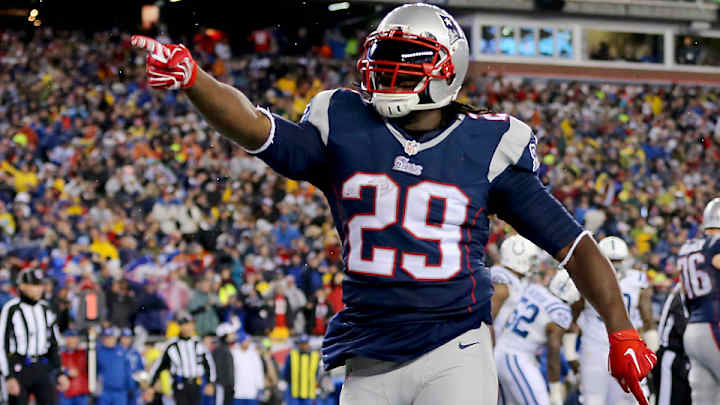LeGarrette Blount is just the latest turnaround story for Patriots

PHOENIX -- In the days leading up to Nov. 20, LeGarrette Blount was unusually quiet on the Patriots running backs’ group text-message thread. All season, he’d been in close contact with his former teammates (yes, to be clear, Blount didn’t rejoin the Patriots from Pittsburgh until Nov. 20, yet he remained on the group message all year), but in the days after he walked out on the Steelers before the end of their Nov. 17 game, Blount emitted not a peep.
• SI.com's complete coverage of Super Bowl XLIX: News, features, video
Then, on Nov. 20, he arrived in Foxborough, contract signed, ready to suit up. “He never told us that he was coming,” fellow running back Shane Vereen said Wednesday. “So he just showed up.”
Blount describes the day as a “locker-room family reunion.” He speaks of hugs, handshakes, daps. “Everybody missed me,” he says, unabashed.
Unlikeliest journey to Super Bowl XLIX? Pats special-teamer Nate Ebner
Teammates recall the day similarly. “Once you’re with us, you’re kind of stuck with us,” Vereen says fondly of his relationship with his on-again, off-again teammate. Third-year back Jonas Gray, who joined the Patriots in 2014, calls Blount one of his best friends on the team. Offensive linemen crow about his ability to detonate even the smallest holes they create, and even Bill Belichick is effusive about Blount’s athleticism and instincts, calling his 166-yard night against the Colts in the AFC Championship “really an outstanding performance.”
But the days before that November day -- well, those they’re leery to mention. Vereen and Gray acknowledge Blount’s persistent off-field issues (he was charged with marijuana possession in August and has a history of pulling punches on teammates and opponents alike) with nods and laughs, no more. Gray says he’ll never judge a book by his cover, or, one supposes, a teammate by his propensity to vacate the sideline mid-game. And asked about his departure from the Steelers, about why it didn’t work, about whether he maybe, just maybe, had an offer from the Patriots waiting when he took flight, Blount does little but smile and chuckle, his eyes dancing, his grin reminiscent of the Cheshire cat.
“Don’t ever give up,” he offers as life advice to a tween during the Media Day circus, and then he turns his head, hears a question about Pittsburgh, about the team on which he maybe, probably, did give up, and all he has to offer is silence and that smile. Over and over: hear the word “Pittsburgh,” break eye contact, smile.
The football world will spend this week tracking the movements of one bruising running back who refuses to speak. His name is Marshawn Lynch, and even if he did talk, what he’d offer wouldn’t be half as interesting as the subject upon which Blount is staying smugly silent. Did he, unhappy with his role, already have a promise from the Patriots on that November night? We may never know, and even if he did, no rule barred him from signing with another team once the Steelers cut him in lieu of suspending or otherwise penalizing him. And really, what’s interesting about Blount’s unlikely trajectory this season has nothing to do with how he got to New England. Instead, it’s how he’s stayed, how he’s found success, how the Patriots seem to rescue and neutralize a troubled player every few seasons, like clockwork.
It is hard to talk about the Patriots' penchant for saving players without mentioning Aaron Hernandez, whose murder trial began Thursday, for a murder he allegedly committed while under contract in New England. That was a clear failure under the system. But still, over the years, the Patriots have had their share of success stories.
Despite separate styles, Belichick and Carroll aren't that different after all
Consider Corey Dillon. In 2003, the running back was a malcontent on a struggling Cincinnati team. He’d been trying to act and talk his way off the Bengals for years, and when he got the chance to be traded to New England before the 2004 season, he was thrilled. The team was coming off a Super Bowl victory, and after a year with the Patriots, Dillon earned his first and only ring without making so much as an off-field ripple. He concedes that being traded to the Patriots saved his career. “Man, it saved everything,” he adds.
Then, in 2007, with a past checkered with marijuana use, reckless driving and indecency, Randy Moss joined the Patriots. He, like Dillon, had complained his way off a losing team (the Raiders), and the Patriots were confident that winning would focus the elite receiver. It did: in his first season in New England, Moss set a career high with 23 touchdowns, and his 1,493 receiving yards were more than he’d logged in all but one prior season.
What’s probably the most audacious Patriots pickup came in 2012, when the team traded for AqibTalibwhile he was serving an Adderall suspension. That wasn’t Talib’s first offense, either; he’d previously gotten in a fistfight with a teammate in Tampa Bay, been charged with resisting arrest without violence and simple battery, and was accused of aggravated assault with a deadly weapon. (Charges were later dropped.) With the Patriots, though, he evolved into one of the NFL’s premier cornerbacks, and his extracurricular activities ceased, or at least ceased to make news.
So when it comes to Blount, there’s a precedent. New England has become a safe haven for the ultra-talented, troubled players who dot NFL rosters, which begs the question of why?
“Coach Belichick… always wants to have a tough, smart, physical football team that performs well under pressure,” former Patriots tight end Benjamin Watson says. “It’s a hard place to play. A lot’s demanded of you, expected of you. But I think the reason why they’ve been so successful continually is because they’ve kept that attitude. It’s always onto the next, what can you do tomorrow, because today or yesterday doesn’t really matter.”
Dillon says he knows Belichick and then-GM Scott Pioli did their homework on him before okaying the trade that brought him to town. When he arrived in New England, it was straight into a meeting with the two men. They asked about his time in Cincinnati, and Dillon explained that his antics were a result of the team’s struggles. “That was the end of the conversation,” Dillon recalls. “(Belichick) asked me another simple question: ‘Can you play for us?’ Without a doubt. Done deal.”
Ever the underdog, fearless Edelman intends to upend Super expectations
Ivan Fears, the longtime running backs coach in New England, has worked with both Dillon and Blount, and he sees a simple answer to the question of how the Patriots pull off these transformations: wins and clear expectations. Belichick -- recent controversy aside -- is known around the NFL for doing things a certain way, for his tight-lipped attitudes toward the media, for his freakish attention to detail, for his insistence on a subjugation of individual to team. With the consistency the team has had ownership- and coaching-wise over the past decade and a half, players can be assured of what they’re stepping into.
“If you’re going to be here, you know what the program is,” Fears says. “You want to be here. You want to stay here. You don’t want to stay here? You know how to get out. … (Players) choose to come to us. They have already made the change by just choosing to come to us. We didn’t change. They know what we are. They either come or don’t come based on what they want to do with themselves.”
When Blount arrived in November, Fears says, he knew what the team was doing, knew what he was buying into. The only nudge the coach felt necessary was a quick reminder of what flies and what doesn’t, and that was that. There was never a worry that Blount would do the same thing to New England as he had to Pittsburgh. These are the Patriots, and the Patriots win, and winning is the best kind of babysitter.
Of course the team’s methods aren’t foolproof. In addition to the saga of Aaron Hernandez, the Patriots have had their share of the accusations and allegations that haunt every NFL team: assault, marijuana, minor traffic violations. Still, their track record is impressive. Blount has a chance to be one of the Patriots’ most valuable offensive pieces on Sunday, and three months ago, he was a malcontent on a decent team with only a slim shot at making any playoff noise.
Question how he arrived here, question why he left Pittsburgh, but in this instance, it’s hard to question that the Patriots’ system works.
